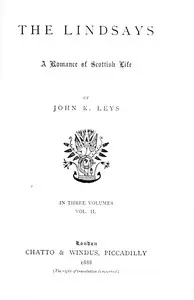"The Heritage of the Kurts, Volume 2 (of 2)" by Bjørnstjerne Bjørnson is a novel following the intertwining lives of young women navigating friendship, love, and societal pressures during their coming-of-age years. Through the experiences of Nora, Tinka, Milla, and Tora, a network of emotions and struggles surfaces, resonating with themes of identity. The story introduces the characters within the school environment, highlighting the girls' unique personalities and relationships. Milla's return to school after mourning places is a point of interest which attracts both sympathy and admiration. Exploring friendship; rivalries, bonds, and the tensions that arise from social status through interactions with Tora and Nora. Their collective experiences hint at broader societal themes as the girls navigate their educative journey, setting the stage for the evolution of their relationships.

The Heritage of the Kurts, Volume 2 (of 2)
By Bjørnstjerne Bjørnson
In a world of friendship and emerging adulthood, young women grapple with love, loss, and societal expectations, setting the stage for unexpected alliances and rivalries.
Summary
About the AuthorBjørnstjerne Martinius Bjørnson was a Norwegian writer who received the 1903 Nobel Prize in Literature "as a tribute to his noble, magnificent and versatile poetry, which has always been distinguished by both the freshness of its inspiration and the rare purity of its spirit". The first Norwegian Nobel laureate, he was a prolific polemicist and extremely influential in Norwegian public life and Scandinavian cultural debate. Bjørnson is considered to be one of the four great Norwegian writers, alongside Ibsen, Lie, and Kielland. He is also celebrated for his lyrics to the Norwegian national anthem, "Ja, vi elsker dette landet". The composer Fredrikke Waaler based a composition for voice and piano on a text by Bjørnson, as did Anna Teichmüller.
Bjørnstjerne Martinius Bjørnson was a Norwegian writer who received the 1903 Nobel Prize in Literature "as a tribute to his noble, magnificent and versatile poetry, which has always been distinguished by both the freshness of its inspiration and the rare purity of its spirit". The first Norwegian Nobel laureate, he was a prolific polemicist and extremely influential in Norwegian public life and Scandinavian cultural debate. Bjørnson is considered to be one of the four great Norwegian writers, alongside Ibsen, Lie, and Kielland. He is also celebrated for his lyrics to the Norwegian national anthem, "Ja, vi elsker dette landet". The composer Fredrikke Waaler based a composition for voice and piano on a text by Bjørnson, as did Anna Teichmüller.












